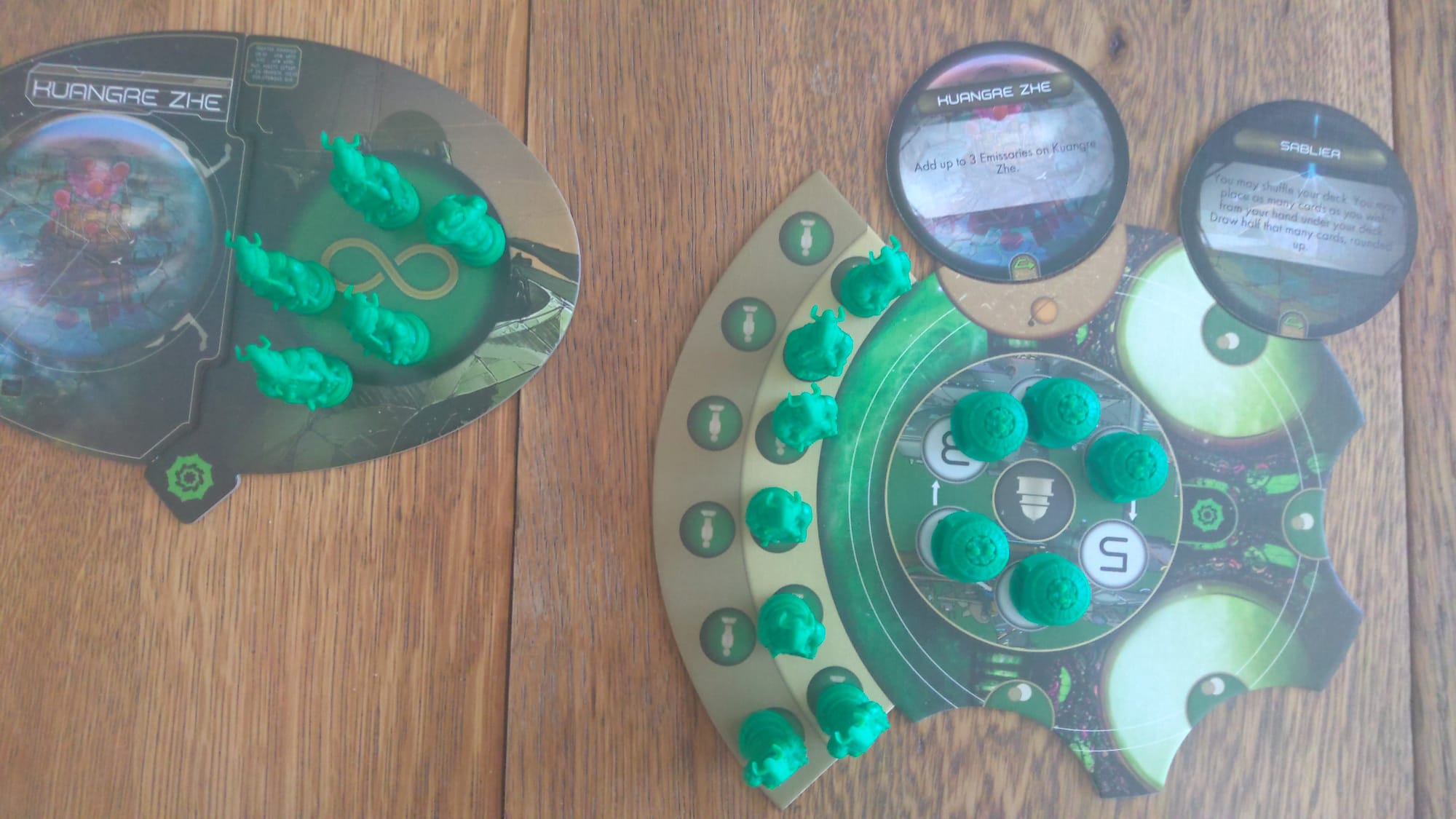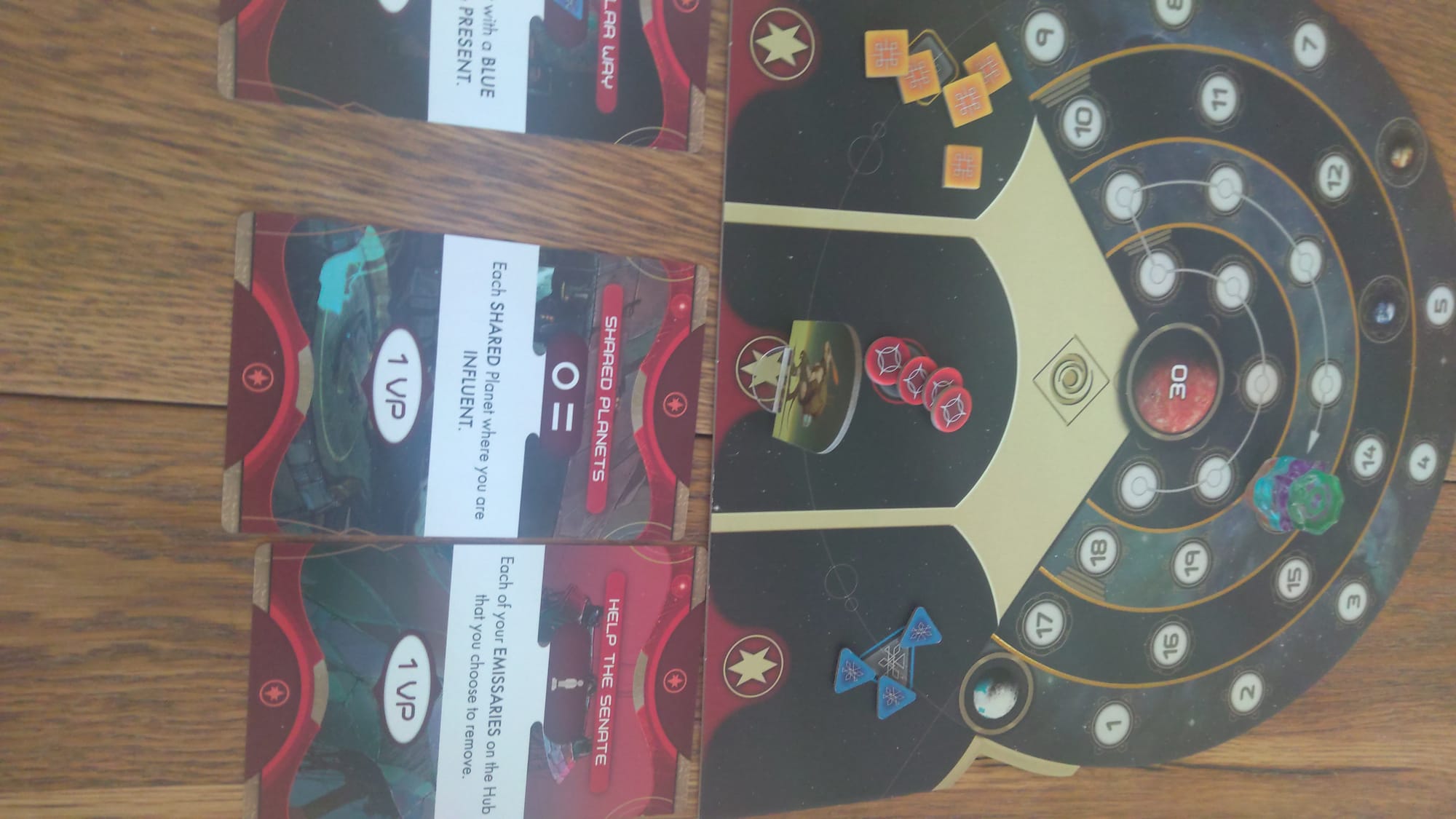Most games have a clock of some kind, be it an overt round timer or inevitable game end condition, but not Galactic Renaissance. The first player to score ten points on their turn after hitting 20 (and thereby hitting 30) wins Galactic Renaissance, but if you miss the mark, you're reset to 20 and gotta try again once play gets back to you. "Well easy enough, just do the thing," you say. Oh, my sweet summer child. If you're playing with only two, maybe, but any higher player count turns everyone into Sisyphus working with cardboard and plastic.

Mechanically, Galactic Renaissance is a hybrid of deck manipulation and area control. Players spend their turns playing and discarding cards from their hand to score points to the threshold of 20 or just order their deck correctly so that they can score the final ten and win. The cards you play and discard go back on the bottom of your deck in the same order, so deciding which cards you keep in hand between rounds and properly stacking your deck is the real name of the game. At first, it feels like cooking with your partner, a chill time planning stuff out. But then you hit your first speed bump, the new public objectives totally don't work with how you've built. It feels like you've started cooking and learned you're missing an ingredient—it's fine, you can substitute or send your partner out for it, but things have gotten less chill. The second and third speed bumps, player interaction and the sheer amount of time it takes for your deck to rotate back through if something happens to your scoring setup, are more drastic. Sure, there are cards that let you handle player interaction, but they're few and far between, and rely on a level of memorizing the deck order of every other player that I'm not really interested in, especially since specialists can come in and mess with everything anyway. So yeah, that one made me feel like Trek's Q had replaced my cooking partner with a howler monkey, and I simply didn't know what to do about that level of hokum.

It was the fourth and fifth that had me questioning if I actually liked board games or if every time I enjoyed my time with the hobby was just a fever dream. It's entirely plausible that the secret rotation of public objectives puts you in a hole you can't climb out of. Or, since nobody knows what the final objectives are going to be until the very end, the only player in a position to finish the game when they're revealed is the one that didn't have a firm grasp of everything and can't land the plane when they get the chance, entering the table into the fail state of looping the airport until you can find a pilot who is simultaneously capable and not tripped up by another passenger before they can get to the controls. When that happened in one of my review plays, I was sorely tempted to make up a rule I missed to hand the game to someone on the third round of everyone being at 20 but no one being able to win or even positively alter their board state without being kneecapped by another player. Determining the winner of Galactic Renaissance has multiple times become a game of endurance, not for the winner, but for the person who has the opportunity to keep the game going deciding to instead throw in the towel. If I'm being generous, my issues are less present at 2 players, but if you're taking up the shelf and table space of War of the Ring, you need to give me a lot more than this box gives. There's a fifth player expansion I'd avoid like the plague 'cause I'm not a masochist, and the fact that it has a 7.8 on BGG makes my argument for why crowdsourced ratings are flawed without saying a word of it.
Galactic Renaissance
Very Bad
By the time the luster of Galactic Renaissance’s nice production wears off, you'll be ready for it to end. But it won't.
Pros
- The minis, art, and oversized cards are good embellishments
- Deck programming is a neat mechanic
Cons
- Nothing firmly progressing players towards the end of the game at a reasonable pace
- Simultaneously dependent upon memorization and had huge chance swings
- I wanted to quit before the game finished every time I played
This review is based on a retail copy provided by the publisher.





















